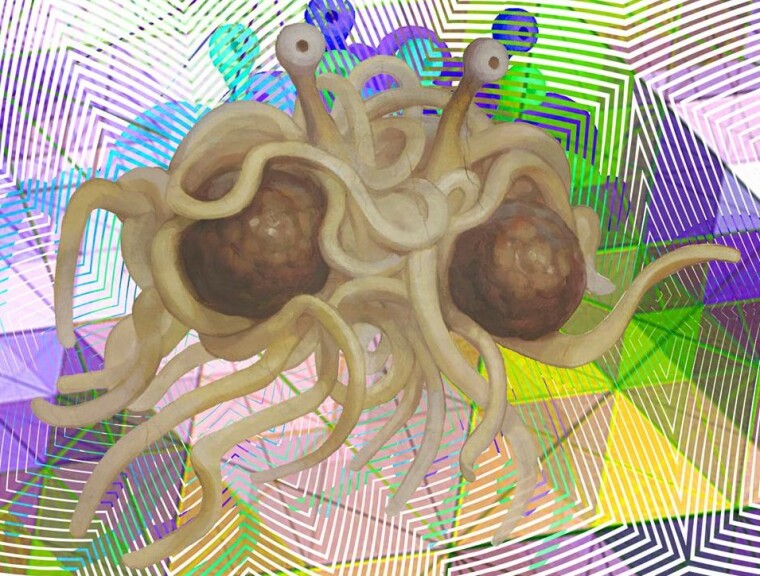Court: 'Church of the Flying Spaghetti Monster' is not religion, but satire

LINCOLN, Nebraska (Christian Examiner) – A federal court in Nebraska has tossed a case in which a state penitentiary inmate claimed he was persecuted because his warden and other prison officials would not allow him to practice his faith – Pastafarianism.
In the 16-page decision, U.S. District Court Judge John M. Gerrard wrote that Pastafarianism – in which the religion's adherents wear colanders on their heads and claim to worship a "Flying Spaghetti Monster" – is not religion, but satire.
As satire, conversations about "His Flying Noodliness" and "FSMism" are protected as free speech, but its adherents cannot claim the same freedom of worship as an historical religion, the judge said in the ruling.
"The Court finds that FSMism is not a 'religion' within the meaning of the relevant federal statutes and constitutional jurisprudence. It is, rather, a parody, intended to advance an argument about science, the evolution of life, and the place of religion in public education. Those are important issues, and FSMism contains a serious argument—but that does not mean that the trappings of the satire used to make that argument are entitled to protection as a 'religion,'" Gerard wrote.
According the "church's" website, FSMism "came out into the open" in 2005, but has secretly existed for hundreds of years – though that seems unlikely with a theology centered on heaven's beer volcano and stripper factory and a belief that pirates were the first Pastafarians. It was Christians, the group claims, who created a false narrative about the evil wrought by pirates.
In reality, the group's aim is to attack both the doctrine of creationism and "intelligent design" in Christianity and, secondly, the belief that religion – and religious texts – should be taken literally. That places the group's claims, the judge wrote, squarely in the category of political speech or satire.
The Court finds that FSMism is not a 'religion' within the meaning of the relevant federal statutes and constitutional jurisprudence. It is, rather, a parody, intended to advance an argument about science, the evolution of life, and the place of religion in public education. Those are important issues, and FSMism contains a serious argument—but that does not mean that the trappings of the satire used to make that argument are entitled to protection as a 'religion.'
The Nebraska case began when inmate Stephen Cavanaugh filed a complaint alleging his rights as a Pastafarian were infringed by the Nebraska State Penitentiary, but the case he brought had few details on how the supposed persecution took place. The judge in the case said the vagaries of the case were purposeful.
"Cavanaugh's complaint actually contains very little detail on FSMism or its purported requirements —perhaps because the deliberate absurdity of its provisions would undermine his argument," the judge noted.
The judge claimed, however, that the parody was designed to look "very much like a religion," and there were few legal precedents to reflect upon when examining the case.
"Candidly, propositions from existing case law are not particularly well-suited for such a situation, because they developed to address more ad hoc creeds, not a comprehensive but plainly satirical doctrine. Nonetheless, it is evident to the Court that FSMism is not a belief system addressing 'deep and imponderable' matters: it is, as explained above, a satirical rejoinder to a certain strain of religious argument. Nor, however, does FSMism advocate for humanism or atheism, which the Court acknowledges have been found to be 'religious' for similar purposes," Gerrard wrote.
The judge concluded in his ruling that understanding the religion of Pastafarianism and the FSM gospel is not a matter of theology. Instead, he wrote, it is a "matter of basic reading comprehension." He called Pastafarianism "plainly a work of satire, meant to entertain while making a pointed political statement."
He also claimed the literary work is no more suitable for drawing a theology from than "any other work of fiction," such as Jonathan Swift's work on cannibalism, A Modest Proposal.
"Of course, there are those who contend —and Cavanaugh is probably among them —that the Bible or the Koran are just as fictional as those books. It is not always an easy line to draw. But there must be a line beyond which a practice is not 'religious' simply because a plaintiff labels it as such. The Court concludes that FSMism is on the far side of that line," Gerrard wrote.
Ironically, a German court ruled the day after Gerrard that Pastafarians there could not hang signs publicly to advertise their religion next to signs for Catholic and Protestant churches. The judge said those holding Pastafarian beliefs were not a recognized religious community.
Pastafarianism does, in fact, have adherents worldwide who have filed multiple lawsuits to have their rights enforced. For instance, three cases in 2015 came before courts in Massachusetts, Wisconsin and Russia in which adherents to the so-called religion asked for the right to wear a colander in their driver's license photos. The Pastafarians won in each case, though the Nebraska case might have a bearing on future challenges.
The first Pastafarian wedding will take place in New Zealand this weekend.
A similar phenomenon arose in Indiana in 2014 when organizers for the Church of Cannabis filed the paperwork to be recognized as a religious organization by the state's government.